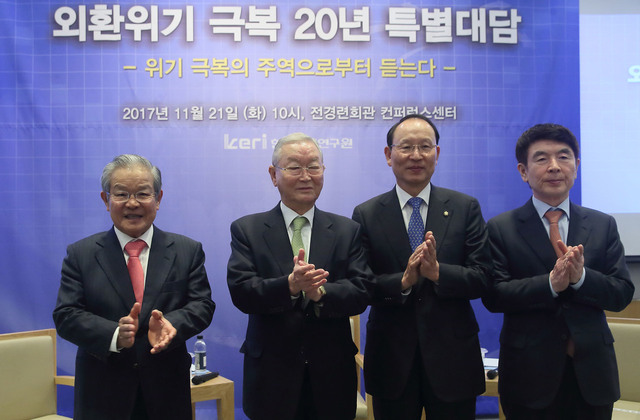 |
|
(From left) Kwon Tae-shin, President of the Korea Economic Research Institute, Lee Kyu-sung, former Minister of Strategy and Finance, Democratic Party lawmaker Choi Woon-yeol, and Korea Institute for International Economic Policy Director Hyun Jung-taek applaud the beginning of a KERI special lecture that was held at FKI Tower in Seoul on the 20th anniversary of South Korea’s emergence from the IMF Crisis. (provided by FKI)
|
Lee Kyu-sung spoke on the 20th anniversary of South Korea’s emergence from the Asian Financial Crisis
“If we want to avoid the South Korean economy becoming the proverbial ‘frog in boiling water,’ we as a society need to leave behind our conflicts and divisions and come up with a better alternative.” This was the response given by former Minister of Strategy and Finance Lee Kyu-sung when asked about the possibility of South Korean economy experiencing another crisis like its foreign exchange troubles in the late 1990s. Lee, who was in charge of the Kim Dae-jung administration’s economic policies in response to the crisis, was speaking at a special talk held by the Korea Economic Research Institute (KERI, president Kwon Tae-shin) at the FKI Tower in Seoul’s Yeouido neighborhood on Nov. 21 to mark the 20th anniversary of South Korea overcoming the crisis. Lee served as the first Finance Minister for the Kim administration, assuming the post in Mar. 1998. Speaking with Korea Institute for International Economic Policy (KIEP) Director Hyun Jung-taek, Lee said important future tasks included “developing technology for the ICT convergence and Fourth Industrial Revolution era and ensuring the flexibility to give us the resilience we need if a crisis does come.” Lee also said South Koreans “need to think about the development of society and business rather than pursuing their own interests and profits,” while adding that businesspeople “cannot do the same privatizing of gains and socializing of losses [through the ‘too big to fail’ myth] that they did during the foreign exchange crisis.” As the factors that explained South Korea’s fast recovery from the crisis, he pointed to Kim’s outstanding leadership, the solidarity shown by the public with their gold collection campaign, and the cooperation of an international community that trusted in and supported South Korea. In response to KERI president Kwon Tae-shin’s observation that the labor market suffers from severe inefficiencies, Hyun stressed that there were “both rigidity and polarization issues.” “If a full-time worker at a major corporation makes 100, then an irregular worker there makes 60, while regular and irregular workers at a small business make 50 and 30, respectively,” Hyun said. “Given that most people agree wages need to be increased at small businesses and for irregular workers, we should first observe a principle of the same pay for the same work.” Kwon also noted ongoing fears of economic crisis, including a “survey of economic experts in which 68% of respondents said the South Korean economy could experience a crisis within the next five years.” In the preceding presentation, Hyun compared South Korea’s economy today with its conditions at the time of the crisis. “There has been a current account surplus for 67 months straight since 2012, while our foreign reserves had increased to US$348.5 billion as of late October, and we became a net international investor as of Sept. 2014,” he noted. “But while there have been improvements to our external soundness, we’ve weakened in terms of domestic economic fundamentals, with persistent low growth, polarization, and a rapid rise in household debt,” he added. Hyun also gave his assessment for why South Korea’s external soundness was weak in the past. “With the ‘too big to fail’ myth, there was a combination of overinvestment that relied on chaebol borrowing, diminished risk management capabilities by financial institutions, and an increase in short-term overseas borrowing,” he said. “Added to this was a large-scale current account deficit as weakened company competitiveness and an inflow of overseas money resulted in a strong won, which led to a steep rise in foreign liabilities.” Hyun added that the Kim administration “increased foreign reserves through policies of monetary and fiscal retrenchment and structural reforms to four major sectors [business, finance, labor, and the public sector], but also suffered issues with economic stagnation and mass unemployment.” “While there were successes in resolving business and financial underperformance and improving fundamentals with lower corporate debt ratios and higher bank capital adequacy ratios, too little was done to promote flexibility in terms of labor reforms,” he concluded. By Kwak Jung-soo, business correspondent Please direct questions or comments to [english@hani.co.kr]






